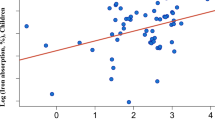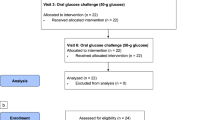Abstract
Objectives: To assess the blood concentration of catechins following green or black tea ingestion and the effect of addition of milk to black tea.
Design: Twelve volunteers received a single dose of green tea, black tea and black tea with milk in a randomized cross-over design with one-week intervals. Blood samples were drawn before and up to eight hours after tea consumption.
Setting: The study was performed at the Unilever Research Vlaardingen in The Netherlands.
Subjects: Twelve healthy adult volunteers (7 females, 5 males) participated in the study. They were recruited among employees of Unilever Research Vlaardingen.
Interventions: Green tea, black tea and black tea with semi-skimmed milk (3 g tea solids each).
Results: Consumption of green tea (0.9 g total catechins) or black tea (0.3 g total catechins) resulted in a rapid increase of catechin levels in blood with an average maximum change from baseline (CVM) of 0.46 μmol/l (13%) after ingestion of green tea and 0.10 μmol/l (13%) in case of black tea. These maximum changes were reached after (mean (s.e.m.)) t=2.3 h (0.2) and t=; 2.2 h (0.2) for green and black tea respectively. Blood levels rapidly declined with an elimination rate (mean (CVM)) of t½=4.8 h (5%) for green tea and t½=6.9 h (8%) for black tea. Addition of milk to black tea (100 ml in 600 ml) did not significantly affect the blood catechin levels (areas under the curves (mean (CVM) of 0.53 h. μmol/l (11%) vs 0.60 h. μmol/l (9%) for black tea and black tea with milk respectively.
Conclusion: Catechins from green tea and black tea are rapidly absorbed and milk does not impair the bioavailability of tea catechins.
This is a preview of subscription content, access via your institution
Access options
Subscribe to this journal
Receive 12 print issues and online access
$259.00 per year
only $21.58 per issue
Buy this article
- Purchase on Springer Link
- Instant access to full article PDF
Prices may be subject to local taxes which are calculated during checkout
Similar content being viewed by others
Author information
Authors and Affiliations
Rights and permissions
About this article
Cite this article
van het Hof, K., Kivits, G., Weststrate, J. et al. Bioavailability of catechins from tea: the effect of milk. Eur J Clin Nutr 52, 356–359 (1998). https://doi.org/10.1038/sj.ejcn.1600568
Received:
Revised:
Accepted:
Published:
Issue Date:
DOI: https://doi.org/10.1038/sj.ejcn.1600568
Keywords
This article is cited by
-
A comparative study to investigate the effects of addition of milk and sugar on total polyphenol, flavonoid, catechin and tannin contents of green and black teas consumed in India
Journal of Food Measurement and Characterization (2021)
-
Effects of Catechin on Activity of Angiotensin-Converting Enzyme and Generation of Reactive Oxygen Species in Rat Aorta
Bulletin of Experimental Biology and Medicine (2020)
-
Bioefficacy of Tea Catechins Associated with Milk Caseins Tested Using Different In Vitro Digestion Models
Food Digestion (2014)
-
The potential role of phytochemicals in wholegrain cereals for the prevention of type-2 diabetes
Nutrition Journal (2013)



